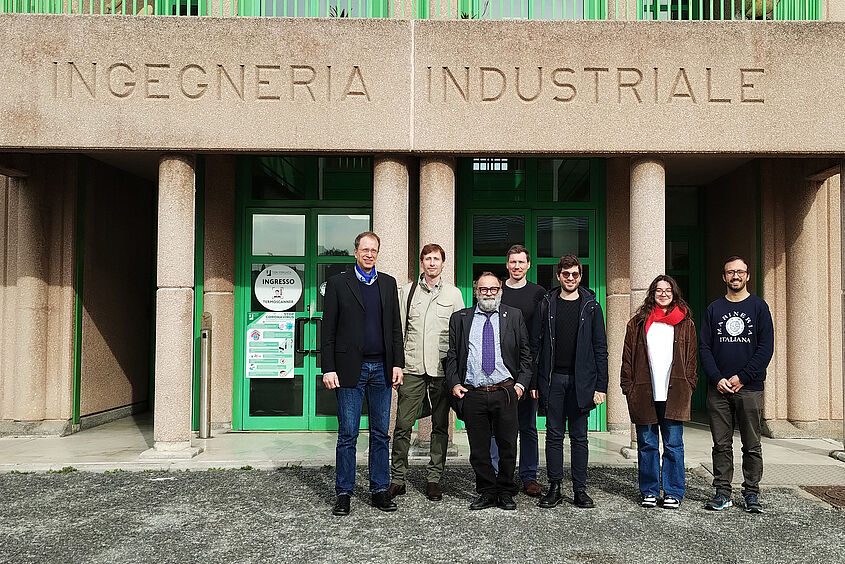Humanity-centred - TH Wildau and Tor Vergata University cooperate on human-centred production structures and future scenarios

At both the University of Tor Vergata in Rome and the Technical University of Applied Sciences in Wildau in Brandenburg, different research areas are focusing on future topics in the field of humanity-centred production and its design. In future, the university in Rome and the university in Brandenburg want to expand their already diverse collaboration in the areas of doctoral studies, research and degree programmes.
The constant transformation of industrial work and production systems through digital transformation, new technologies and the influence of AI are also changing the work performed by people. In addition, demographic, global and political changes are having a huge impact on the design of industrial structures. The scope of the many influencing factors, some of which are new, requires the development and play-through of scenarios for how industrial production and the world of work will change for people. To this end, new production methods and technologies and the associated impact of digital transformation are being developed and tested and the effects on the human working environment analysed. The focus is also increasingly shifting back to people.
Humanity-centred for human-centric industrial structures
The area of humanity-centred production and its design is dedicated to all topics relating to how production systems can be aligned with the needs of human requirements, skills and experiences. Among other things, this involves what social participation could look like in new working environments. And it is about how people can actively participate in production processes again with new concepts, for example, and be supported by technical and data-driven tools.
"If we produce for humanity, we must not stop at the individual person. We have to consider our entire global environment in a sustainable way: all living beings, the quality of the soil, water and air. The loss of species. The changes in the climate. We are an integral part of the Earth system, where changes in one component can affect all other components."
Both at the University of Tor Vergata in Rome and at the Technical University of Applied Sciences Wildau (TH Wildau), different research areas are working on these future topics and are cooperating on various levels. For example, there are currently six doctoral students in Prof Jörg Reiff-Stephan's iC3@Smart Production research group at the TH Wildau who are working on topics in the broad field of automation technology. Two of them are currently doing their doctorates on these topics in Rome. Simon Wilbers is researching the topic "Limits of Automation - Model or method for gauging automation effectiveness under consideration of relative limits to automation for manufacturing operations" to evaluate automation limits in production processes. Dominique Zeise is developing a model to identify industry-specific characteristics for the evaluation of process optimisation potential.
Interdisciplinary collaboration is to be further expanded in the future. In Rome, Prof Marco Ceccarelli, who also heads the Laboratory for Robotics and Mechatronics (LARM: Laboratorio di Robotica e Meccatronica), is coordinating and supervising the doctoral students from Wildau.
Intensive exchange and expansion of cooperation
Representatives of the TH Wildau were guests in Rome back in spring. At the end of May, a delegation from Rome visited Wildau to get to know the TH Wildau better, to take a look at the plans for the next doctoral candidates and to explore joint opportunities for research work. Prof. Ceccarelli, Assistant Prof. Matteo Russo (PhD supervisor in Rome), Luca Quattrucci (PhD student at LARM) and the head of the PhD programme, Prof. Gianluca Verona Rinati, met with their Wildau colleagues Prof. Jörg Reiff-Stephan, Prof. Andreas Foitzik and Dr Andrea Böhme as well as the Wildau teams from Aeronautics, Automation Technology and Microsystems Technology on 29 May. The TH Wildau and Tor Vergata are supported by representatives of the ERASMUS programme. In the Photonics (Master's) degree programme, students have the opportunity to obtain a double degree and in Materials Science, exchange semesters abroad can be completed.
Prof Jörg Reiff-Stephan, TH Wildau: "The cooperation with our colleagues in Rome is a great example of international and interdisciplinary collaboration at university level. In addition to the great opportunities we already have, we are focusing on setting up a joint education programme in the field of mechatronics and automation technology in the future."
About the "Università degli studi di Roma Tor Vergata"
The university began educating students in 1982 and was designed along Anglo-Saxon lines: it extends over 600 hectares in the east of Rome and is home to important research institutions on site, including the National Research Council (CNR) and the Italian Space Agency (ASI). The university offers more than 106 different degree programmes in its 18 faculties and currently has around 34,000 students.
Download News and picture mynewsdesk.com
Contact person at TH Wildau
Prof. Dr Jörg Reiff-Stephan
TH Wildau
Hochschulring 1, 15745 Wildau
Phone +49 (0)3375 508 418
E-mail: jrs@th-wildau.de
Contact persons External Communication TH Wildau
Mike Lange / Mareike Rammelt
TH Wildau
Hochschulring 1, 15745 Wildau
Phone +49 (0)3375 508 211 / -669
E-mail: presse@th-wildau.de
